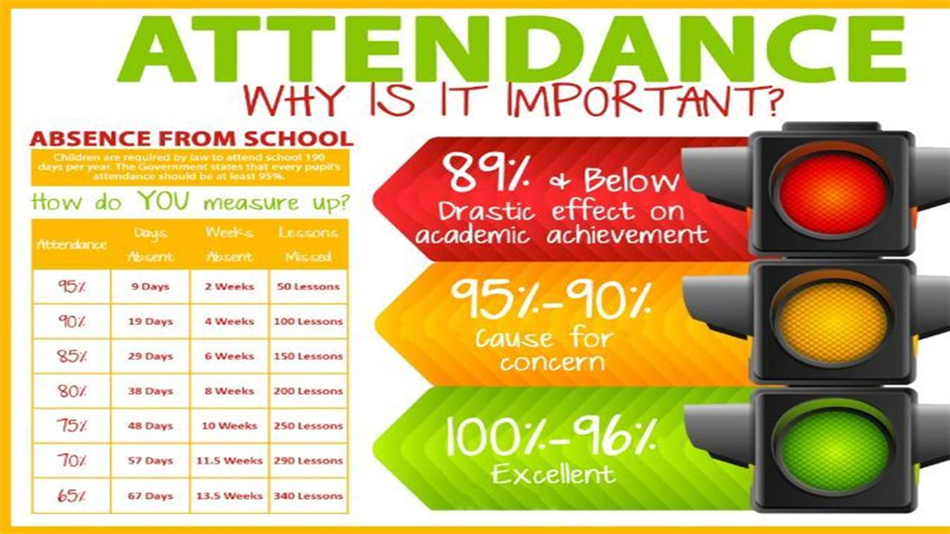Attendance



Our school day runs from 8.45am until 3.30pm.
Registers close at 8.55am and after this point your child will be marked as late.
Early bird activities run from 8.45am - 9.00am, so we urge you to have your children in school for 8.45am.
Face-to-face education is important in helping pupils to fulfil their potential.
During school time we believe pupils should be in class with their teachers and peers and enjoying all the benefits that brings.
Parents or carers of a child have a legal responsibility to ensure their child receives a suitable education. This is usually achieved through regular attendance at school.
Keep reading the information below from the Department of Education for everything you need to know about school attendance...
Why is regular attendance so important?
Being in school every day that it is open, is important to your child’s achievement, wellbeing, and their wider development.
Evidence shows that the students with the highest attendance throughout their time in school gain the best GCSE and A Level results.
Here’s what the data shows:
- Pupils with higher attainment at KS2 and KS4 had lower levels of absence over the key stage compared to those with lower attainment.
- Pupils who did not achieve the expected standard in reading, writing and maths in 2019 had an overall absence rate of 4.7% over the key stage, compared with 3.5% among pupils who achieved the expected standard and 2.7% among those who achieved the higher standard.
- Pupils who did not achieve grade 9 to 4 in English and maths GCSEs in 2019 had an overall absence rate of 8.8% over the key stage, compared with 5.2% among pupils who achieved a grade 4 and 3.7% among pupils who achieved grade 9 to 5 in both English and maths.
- Generally, the higher the percentage of sessions missed across the key stage at KS2 and KS4, the lower the level of attainment at the end of the key stage.
- Among pupils with no missed sessions over KS2, 83.9% achieved the expected standard compared to 40.2% of pupils who were persistently absent.
- Among pupils with no missed sessions over KS4, 83.7% achieved grades 9 to 4 in English and maths compared to 35.6% of pupils who were persistently absent.
There are only a small number of circumstances where missing a school day is permitted.
When can my child be absent from school?
When you register your child at school, you have a legal duty to ensure your child attends that school regularly.
This means that your child must attend every day that the school is open, unless:
- Your child is too ill to attend that day.
- You have asked in advance and been given permission by the school for your child to be absent on that day due to exceptional circumstances.
- Your child cannot attend school on that day because it is a day you are taking part in religious observance
- Your local authority is responsible for arranging your child’s transport to school and it is not available on that day or has not been provided yet; or
- You are a gypsy/traveller family with no fixed abode, and you are required to travel for work that day meaning your child cannot attend their usual school. In most circumstances, however, your child is required to attend another school temporarily during such absences.
These are the only circumstances where schools can permit your child to be absent.
What do I need to do if my child needs to be absent from school for one of those reasons?
You should contact their school as early as possible to explain why. If not, your child’s school will contact you on the first morning of their absence to find out why.
All parents can request a ‘leave of absence’ for their child which gives them permission to be absent from school. Leaves of absence must be applied for before your child will be absent and will only be granted in exceptional circumstances.
Your child’s headteacher has the final say over whether to approve the request and how long your child can be absent.
Their decision will be made after considering the specific facts and circumstances behind your request.
Can I take my child on holiday during term time?
Parents should plan their holidays around school breaks and avoid requesting leaves of absence for holidays unless it is unavoidable.
As leave of absence is only granted in exceptional circumstances, it is unlikely that your child’s headteacher will agree a leave of absence for a family holiday.
If permission is refused and you keep your child off school on the days requested, you are likely to be committing an offence and be issued a fixed penalty notice or be prosecuted by your local authority.
Where can I get support to help my child attend school?
Children may struggle to attend school for a wide range of reasons.
If your child is struggling to attend school, both their school and your local authority also have responsibilities to help you to support your child’s attendance.
In most cases, if your child’s attendance level is falling, their school will contact you to explore the reasons and discuss what help can be put in place to help you overcome the barriers they are facing.
If your child is struggling to attend school, you can expect the school to meet with you and your child if they are old enough. The school will want to understand the reasons for their absence and what support you or they need to overcome the barriers to attendance they are experiencing.
If the barriers to your child’s attendance are in school – such as they are having friendship problems – the school is responsible for working with you to help overcome the issues.
Information on who in school you can contact for help, including the school’s senior leader responsible for attendance, can be found in the school’s attendance policy on its website or available in hard copy from the school itself.
If the barriers to attendance you or your child are facing go beyond the remit of the school – such as a transport or a mental health issue – both the school and local authority have a responsibility to help you. This includes helping you to access the wider support you might need, for example from the school nurse or from local housing or transport teams.
As part of the conversation you have with your child’s school you will agree a set of joint actions you will all take to help overcome any barriers to attendance.
This agreement will often include a commitment to refer or help you to access support services in exchange for an agreement from you to engage and take part in the support offered. They will also arrange mutual convenient times for you to come together to review these and your child’s progress.
This agreement may take the form of an informal action plan, an early help plan, or a parenting contract – depending on the complexity of the reasons for your child’s absence.
Attendance has changed from August 19th 2024
From the 2024-25 school year, there will be new national rules on how penalty notices for school absence are used. The new rules mean that all schools must consider giving a penalty notice to a parent when a child has missed 10 or more sessions (5 days) for unauthorised reasons within a 10 school week period, and support to help your child be in school is not appropriate. If support would help improve attendance, that should be provided by the school or local council rather than a penalty notice. You cannot be given a penalty notice for absence that is authorised by the school (such as illness). A penalty notice will usually only be issued in cases of holidays taken in school time, or for other reasons where the school or council is trying to help attendance to improve and you are not engaging in that support or it is not working and they believe that a penalty notice would improve attendance. Your school or council can still decide to issue a penalty notice or proceed to prosecution for less amounts of absence than 10 sessions (5 days) if support is not appropriate and they think it would improve attendance. For example, if parents are often taking shorter holidays in school time to deliberately avoid a fine.
When may I be given a ‘notice to improve’ instead of a penalty notice?
In some cases, your school or local council may choose to give you a ‘notice to improve’ instead of a penalty notice once the national threshold of 10 sessions (5 days) of unauthorised absence is met. This is a formal written warning that, unless attendance significantly improves, you will be issued with a penalty notice. This is to give you another chance to work with the school to improve your child’s attendance. A ‘notice to improve’ will not be given if you take a holiday in term time without permission.
How much could I be fined if my child misses school? How many penalty notices can I get?
From the 2024-25 school year, the fine for school absence penalty notices across the country will be £80 if paid within 21 days, or £160 if paid within 28 days. If you do not pay the fine you may be prosecuted in court. If a parent receives a second penalty notice for the same child within any three-year period, the charge will be a flat rate of £160; there will be no reduction if paid within 21 days. Penalty notices for absence before the 2024-25 school year do not count. A parent cannot receive more than two penalty notices for the same child within any three-year period. This is because it is clear that previous penalty notices have not worked. Once this limit has been reached, another action like a parenting order or prosecution will be considered. Penalty notices for absence before the 2024-25 school year do not count in this limit.
Is my child too ill for school?
Guidance on infection control in schools

